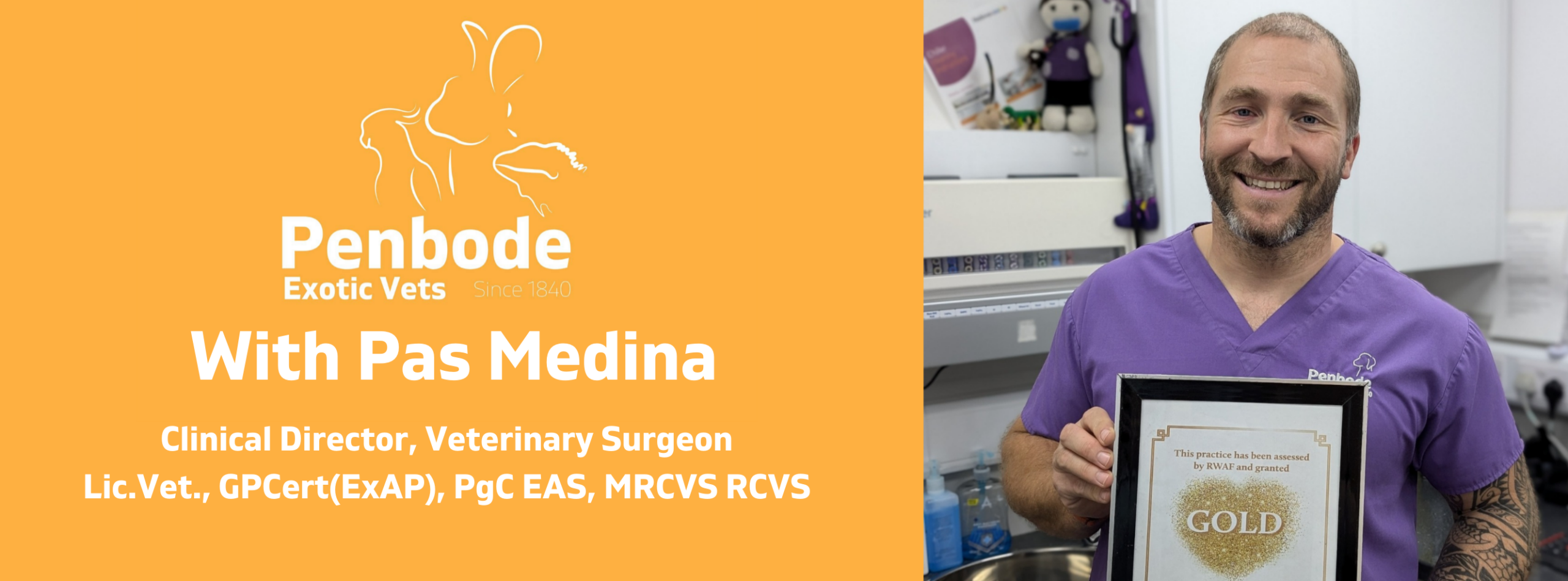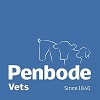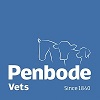Exotic Pets

At Penbode Vets, we want to provide care to as many of your pets as possible. This is why we have the exotic species department.
Pas Medina is an Advanced Practitioner in Zoological and Exotic Medicine and has trained for several years to be able to care for your less traditional pets. From Mice to Pythons, and from Budgies to Coypus, we will do our best to guide you with advice on diet, husbandry and enclosures, as well as providing you with any veterinary care your pet may need.
In addition, we are proud to be a Gold Standard, Rabbit Welfare Association and Fund Approved, Rabbit Vet.
Here are some examples of the services we can provide for your exotic pets:
– Vaccinations. We follow the most up-to-date vaccination protocols for rabbits.
– Neutering. Both surgically (spay, castration, vasectomy) and chemically (implant).
– Emergency service. All of our vets and nurses have been trained to provide emergency care for exotic species, and Pas can help over the phone on those more challenging cases.
– Imaging. To include ultrasonography, digital x-ray and dental x-ray.
We also work alongside several wildlife rehabilitators, zoo collections and the British Divers Marine Life Rescue (BDMLR).
Follow us on Facebook to see regular updates on cases!
Mammals
Routine procedures including vaccination, micro-chipping dentistry, neutering. Disease diagnosis, imaging, surgery and critical care.
· Cats
· Dogs
· Seals
· Rodents
· Chinchillas
· Primates
· Rabbits
· Degus
· Hedgehogs
· Bats
· Mice
· Pygmy goats
· Ferrets
· Sugar Gliders
· Guinea Pigs
· Skunks
· Hamsters
· Gerbils
Routine procedures including vaccination, micro-chipping dentistry, neutering. Disease diagnosis, imaging, surgery and critical care.
· Cats
· Dogs
· Seals
· Rodents
· Chinchillas
· Primates
· Rabbits
· Degus
· Hedgehogs
· Bats
· Mice
· Pygmy goats
· Ferrets
· Sugar Gliders
· Guinea Pigs
· Skunks
· Hamsters
· Gerbils
Seals
We work very closely with the British Divers Marine Life Rescue (BDMLR) to help with any marine mammal which is stranded or injured along our coastline. If a marine mammal is found, the BDMLR are called, they collect the creature and take it to our Stratton branch. Pas and many of our nurses have been trained to deal with such animals. We see four or five seals hospitalised each year and they normally stay between one and three days, being rehydrated and treated for wounds and exhaustion. They are then moved to a seal rescue centre, where they will stay until fully recovered.
We work very closely with the British Divers Marine Life Rescue (BDMLR) to help with any marine mammal which is stranded or injured along our coastline. If a marine mammal is found, the BDMLR are called, they collect the creature and take it to our Stratton branch. Pas and many of our nurses have been trained to deal with such animals. We see four or five seals hospitalised each year and they normally stay between one and three days, being rehydrated and treated for wounds and exhaustion. They are then moved to a seal rescue centre, where they will stay until fully recovered.
Birds
Routine procedures and behaviour, micro-chipping, neutering (using chemical implants) beak, claw and wing clipping,
treating the egg bound bird.
· Budgerigars
· Parrots
· Parakeets
· Ducks
· Turkey
· Birds of prey
· Geese
· Chickens
· Pheasants
Routine procedures and behaviour, micro-chipping, neutering (using chemical implants) beak, claw and wing clipping,
treating the egg bound bird.
· Budgerigars
· Parrots
· Parakeets
· Ducks
· Turkey
· Birds of prey
· Geese
· Chickens
· Pheasants
Any other species
Routine procedures including micro-chipping, surgery other medical treatments.
· Spiders
· Stick insects
· Frogs
· Snakes
· Koi Carp
· Toads
· Axolotls
· Geckos
· Lizards etc
Routine procedures including micro-chipping, surgery other medical treatments.
· Spiders
· Stick insects
· Frogs
· Snakes
· Koi Carp
· Toads
· Axolotls
· Geckos
· Lizards etc

